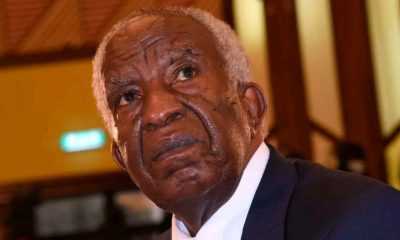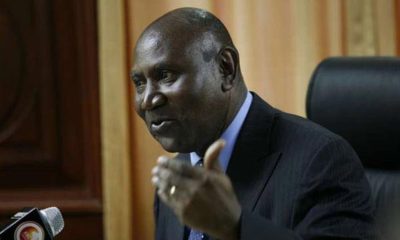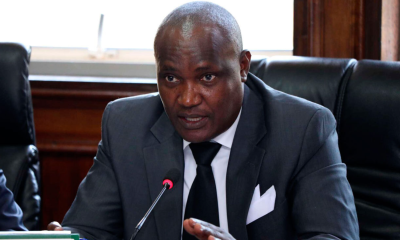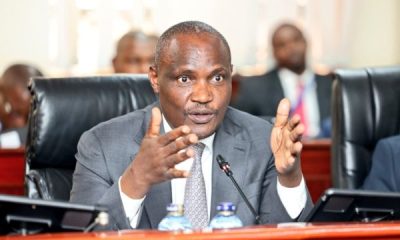Economy
Parents To Start Paying Exam Fees From Next Year, Government Announces
While specific criteria for determining eligibility remain unclear, the Treasury CS mentioned a figure of Sh5,000 in passing, though he did not elaborate on how this amount relates to the new fee structure.

Treasury CS Mbadi says decade-long exam waiver will end as government seeks to reduce education spending amid budget constraints
Parents across Kenya will be required to pay national examination fees starting next year, Treasury Cabinet Secretary John Mbadi announced yesterday, marking the end of a decade-long government subsidy that has covered costs for all students.
The policy reversal affects both Kenya Certificate of Primary Education (KCPE) and Kenya Certificate of Secondary Education (KCSE) examinations, with the government currently covering the full Sh7,200 registration fee per candidate.
Speaking during a television interview, Mbadi justified the decision by citing unsustainable costs and competing priorities within the education sector amid significant budget deficits.
“We have to review the cost in the sense that why should we pay for examinations for all students, including those in private schools?” Mbadi questioned.
“We should be subsidising examinations for those who cannot afford it, especially in public schools.”
Despite the policy change, Mbadi assured parents that all students sitting for examinations this year will not be affected, as it would be “too late” to implement the changes now.
“For this year, it’s too late. We are going to process examinations for all candidates, whether you are able to pay or not,” he said.
The announcement comes as a relief to thousands of families who had feared the waiver removal would take immediate effect, potentially disrupting their children’s academic progress.
From 2026, the Ministry of Education will implement a differentiated fee structure, ensuring that only students from financially capable families pay examination fees while maintaining support for vulnerable households.
“If today my child is doing KCSE, the government pays for that child, and it’s the child of a CS, why should that be the case? We cannot afford to subsidise people who don’t need the subsidy,” Mbadi explained.
While specific criteria for determining eligibility remain unclear, the Treasury CS mentioned a figure of Sh5,000 in passing, though he did not elaborate on how this amount relates to the new fee structure.
The Parliamentary Budget Office had recommended ending the exam waiver, suggesting it could free up approximately Sh5 billion annually for other educational priorities such as capitation funding.
This recommendation came amid concerns over a Sh91.8 billion deficit in the education sector.
The exam fee waiver was introduced in 2016 under former Education Cabinet Secretary Fred Matiangi to ensure no student missed national examinations due to financial constraints.
In a related development, Mbadi revealed plans to reduce examination costs by printing papers locally rather than abroad, where the process currently costs approximately Sh1.5 billion annually.
“We must make sure that the printing of exams is done cheaply,” he said, noting that Kenya already prints security-sensitive documents like passports locally.
The Presidential Working Party on Education Reforms had recommended local printing to reduce costs and enhance efficiency, though Mbadi emphasized that robust security measures would be essential to maintain examination integrity.
“You will still end up having the examination leaked, and it has happened many times. So, let us make sure that the cost of managing examinations in this country is contained to the bare minimum,” he added.
The announcement has generated significant debate, with critics arguing that the policy shift will burden families already struggling with high living costs and school fees.
Some view it as a reversal of progress made in making education accessible to all Kenyan children.
Supporters, however, argue that targeted subsidies make more fiscal sense, ensuring government resources reach those who need them most while reducing overall public expenditure.
The policy change represents a significant shift in Kenya’s education financing approach, moving from universal exam fee coverage to a means-tested system that the government hopes will better allocate limited resources while maintaining educational access for vulnerable populations.
The new fee structure is expected to take effect for the 2026 examination cycle, with the Ministry of Education set to announce detailed implementation guidelines in the coming months.
Kenya Insights allows guest blogging, if you want to be published on Kenya’s most authoritative and accurate blog, have an expose, news TIPS, story angles, human interest stories, drop us an email on [email protected] or via Telegram
-

 Business6 days ago
Business6 days agoKakuzi Investors Face Massive Loss as Land Commission Drops Bombshell Order to Surrender Quarter of Productive Estate
-

 Investigations1 week ago
Investigations1 week agoINSIDER LEAK REVEALS ROT AT KWS TOP EXECUTIVES
-

 Investigations4 days ago
Investigations4 days agoCNN Reveals Massive Killings, Secret Graves In Tanzania and Coverup By the Govt
-

 Business6 days ago
Business6 days agoBANKS BETRAYAL: How Equity Bank Allegedly Helped Thieves Loot Sh10 Million From Family’s Savings in Lightning Fast Court Scam
-

 News1 week ago
News1 week agoEXPOSED: How Tycoon Munga, State Officials, Chinese Firm Stalled A Sh3.9 Trillion Coal Treasure In Kitui
-

 News1 week ago
News1 week agoEx-Boyfriend Withdraws Explosive Petition to Remove DPP After Criminal Case Against Capital FM Boss Resurfaces
-

 Politics5 days ago
Politics5 days agoI Had Warned Raila Of Possible Fallout In The Odinga Family After His Death, Oburu Says
-

 Business12 hours ago
Business12 hours agoConstruction Of Stalled Yaya Center Block Resumes After More Than 3 Decades and The Concrete Story Behind It































